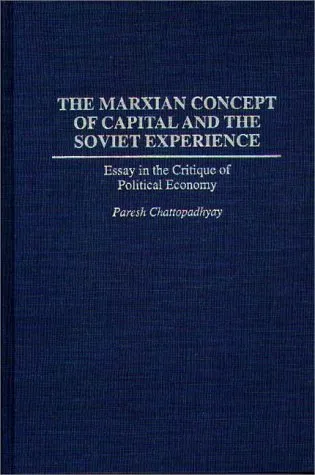The Marxian Concept of Capital and the Soviet Experience: Essay in the Critique of Political Economy
4.7
Reviews from our users

You Can Ask your questions from this book's AI after Login
Each download or ask from book AI costs 2 points. To earn more free points, please visit the Points Guide Page and complete some valuable actions.The Marxian Concept of Capital and the Soviet Experience: Essay in the Critique of Political Economy
This intricate exploration of the intersection between Karl Marx’s theoretical formulations on capital and the practical economic experience of the Soviet Union represents a deep dive into economic theory and political history. Authored by Paresh Chattopadhyay, the book offers a critical evaluation of Soviet economic practices through a Marxian lens.
Detailed Summary of the Book
The book commences with an articulate analysis of Marx's original writings, focusing on his key concepts of capital. Marx viewed capital not just as a static entity but as a dynamic relationship integral to the production process under capitalism. Chattopadhyay elucidates Marx's definitions and scrutinizes how these were ostensibly integrated—or, more accurately, misapplied—in the Soviet economic structure.
Subsequently, the discussion transitions to the Soviet experience, contrasting Marx's theoretical expectations with the Soviet economic reality. This exploration reveals significant deviations from Marxian economics, stemming from misunderstandings or deliberate appropriations of Marx for pragmatic governance needs. The Soviet experience, marked by centralized planning and state ownership, starkly contrasts with Marx’s vision of a classless and stateless society.
The author meticulously dissects various facets of Soviet economic policies, their implications, and their divergences from Marxian thought. By doing this, Chattopadhyay not only critiques but also offers an alternative narrative on the economic evolution witnessed during the Soviet era.
Key Takeaways
- Marx’s concept of capital involves the relations of production and is not merely a monetary expression.
- The Soviet Union’s approach was more reminiscent of state capitalism than true Marxism as envisaged by Marx himself.
- The book provides a methodological framework for understanding the discrepancies between Marxist theory and Soviet practice.
- Analyzing the Soviet economic model offers critical insights into the limitations and potential misapplications of Marxian theory when used as a tool for state policy.
Famous Quotes from the Book
"Understanding capital is to understand the entire class structure of modern society, and in this lies the significance of Marx’s work – it exposes the undercurrents of the capitalist world order."
"The transformation of Marxian theory into Soviet praxis was less an evolution of socialist thought than a complex departure facilitated by historical exigencies rather than theoretical fidelity."
Why This Book Matters
This book is a critical resource for scholars and students of political economy and Marxist theory. It stands as a seminal reference for understanding the divergence between ideological theory and its practical applications. By rigorously analyzing the Soviet economic model’s shortcomings through the study of Marxian economic theory, Chattopadhyay provides valuable lessons that remain relevant in contemporary discussions on socialism and capital.
Furthermore, the book’s critical perspective challenges readers to reconsider commonly held assumptions about Marxism’s implementation and invites dialogue on the principles of a truly socialist economy. This makes it indispensable not only for historians and economists but also for anyone interested in the philosophy of economics.
Free Direct Download
You Can Download this book after Login
Accessing books through legal platforms and public libraries not only supports the rights of authors and publishers but also contributes to the sustainability of reading culture. Before downloading, please take a moment to consider these options.
Find this book on other platforms:
WorldCat helps you find books in libraries worldwide.
See ratings, reviews, and discussions on Goodreads.
Find and buy rare or used books on AbeBooks.


